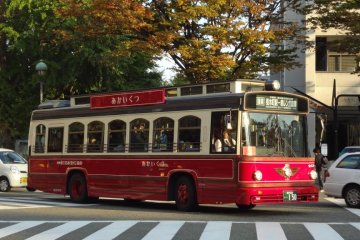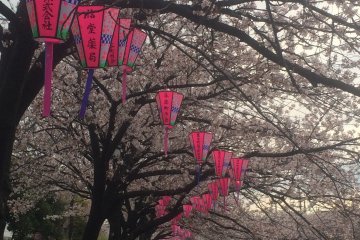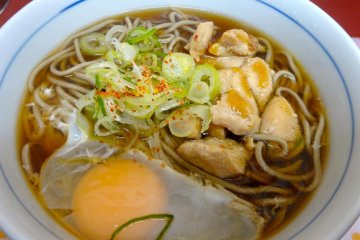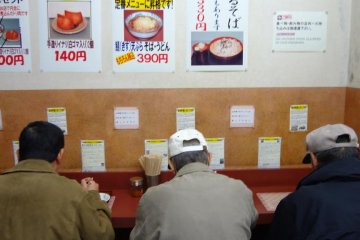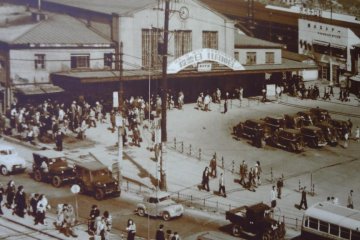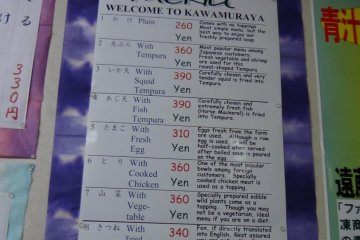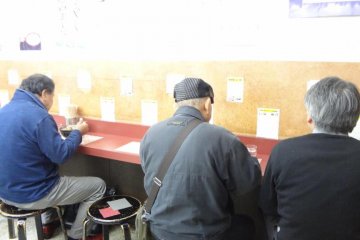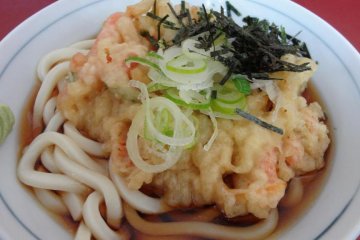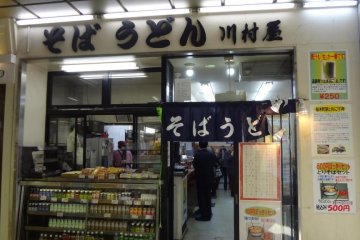Few Japanese can resist the smell of katsuo and soy sauce when we are hungry. Me? Of course I can’t. If I happen to be close to Sakuragi-cho during lunchtime, my feet go toward Kawamura-ya soba shop and my mouth orders “Ika-ten soba” automatically.
Eki-soba (soba shops inside of a train station) or Tachigui-soba (standing soba shops at stations) are quite popular in Japan. Their concept is to serve hot noodles immediately while the customer is waiting for a train. So the shop should be at a station, and they have to serve you quickly. Because of this, we don’t have high expectation about the taste of Eki-soba. But! Do you know what I’m going to say? Kawamura-ya betrays your expectations in a very good meaning. The shop has so many fans of their tasty broth that I have never seen an empty seat!
Eki-soba manners
As I mentioned, people think Eki-soba should be quick and smooth. So enjoy THE EXPERIENCE!
At first, you have to order. When you come into the shop, an Oba-chan (there are three or four elderly female cooks working inside the counter) will say hello (Irasshai-mase!) to you. When your gaze meets hers, don’t think too deeply about your choice. You have only a few seconds to order. Please be quick!
My recommendations are Ika-ten Soba (hot squid tempura soba; 390 yen) and Hiyashi-ten Soba (cold vegetable tempura soba; 430 yen). If you choose the squid tempura, the Oba-chan might ask you in Japanese whether you want it cut in half or not. A gesture or nod is fine. And if you order vegetable tempura, you need to say whether you want her to add wasabi (Japanese horseradish) or not. WASABI!
When you order, you should pay immediately. The exact amount would be best. Please put the money on the blue plate on the counter. And move a little bit further into the restaurant, because the next customer will be waiting to do the same thing as you have just done.
Soon the Oba-chan will serve you and say it is your bowl: “Ika-ten no kata.” (The person who ordered Ika-ten) Then, bring your bowl to the table and enjoy it. Chopsticks and spices are on the table. Water is self-service.
After you finish, please take your bowl and other things to the counter in the back. If you say “Gochisou-sama deshita!” (It was delicious!) with a nice smile, they will be very happy to hear it.
The estimated stay at this shop is less than 10 minutes. So you can save money and time. How efficient!
History of this Shop
To tell the truth, this shop became 111 years old in 2011. The shop was opened in 1900, just after the first railway in Japan from Shimbashi to Yokohama was built. You can see a photo from 1904 on the inside wall of Sakuragi-cho station and feel the atmosphere of those days. I have included a few of those photos here, in this story. A heroic woman, Kura Saito, who was running a first-class Japanese restaurant near Kannai, negotiated the rights to do business inside the station and she started a restaurant. Most of her customers were top-level politicians, businessmen, and speculators. It was said that she was able to subtly influence politics from within her restaurant.
Kawamura-ya’s noodles are like fast food, but healthier, served in smaller portions and with fewer calories! It is a perfect choice if you want to try some Japanese food, but you have no time, and a tight budget. I think you will enjoy it very much!
*This is Part 2 of a two-part series on standing food shops. Part 1 introduced a great sushi shop in Ofuna Station.



